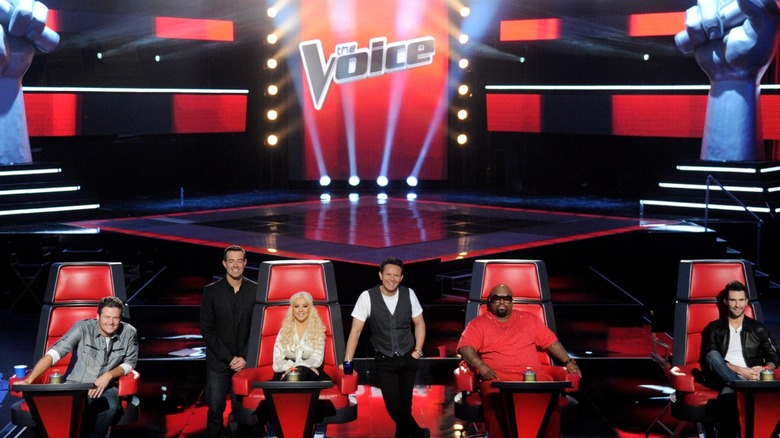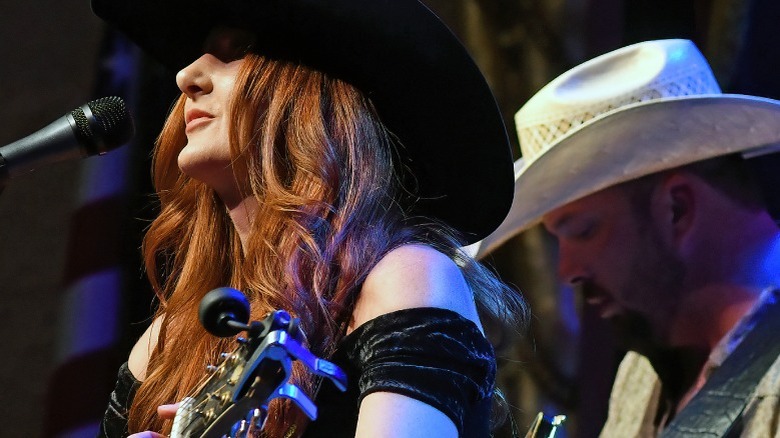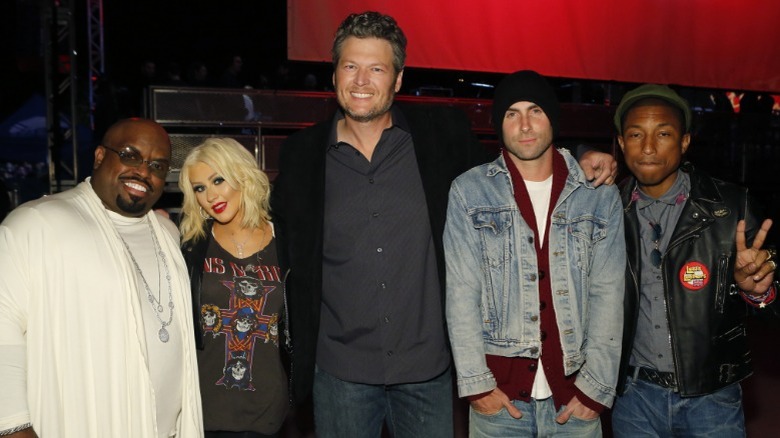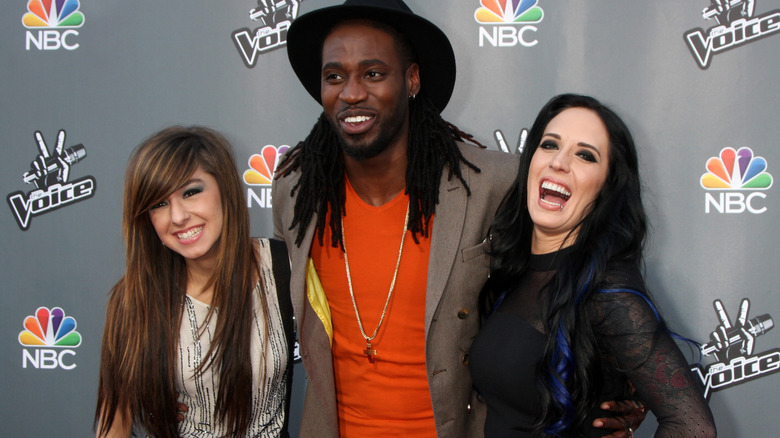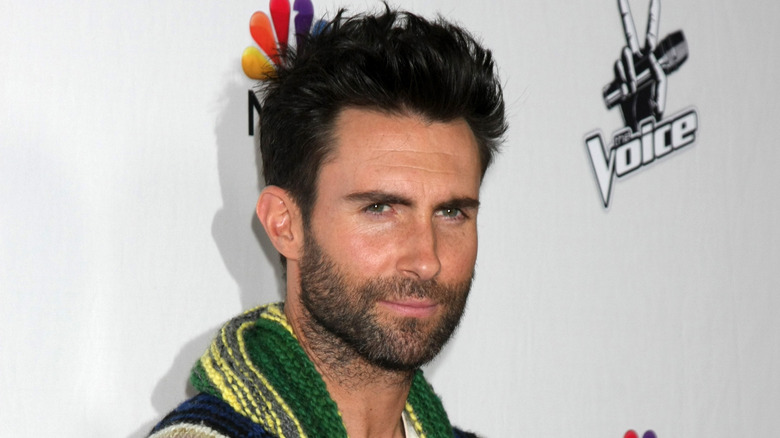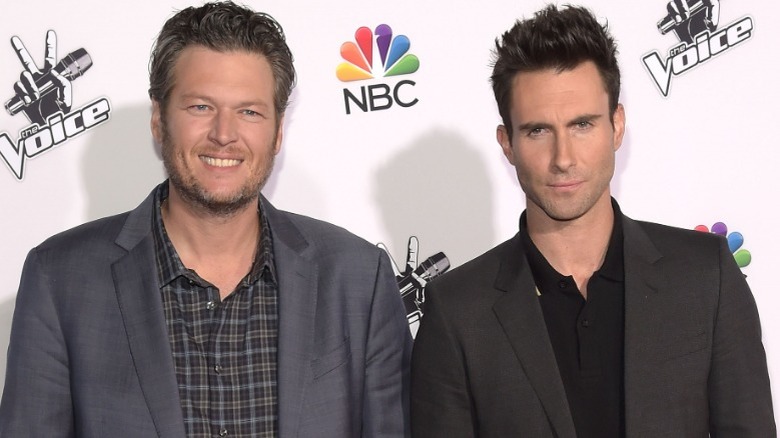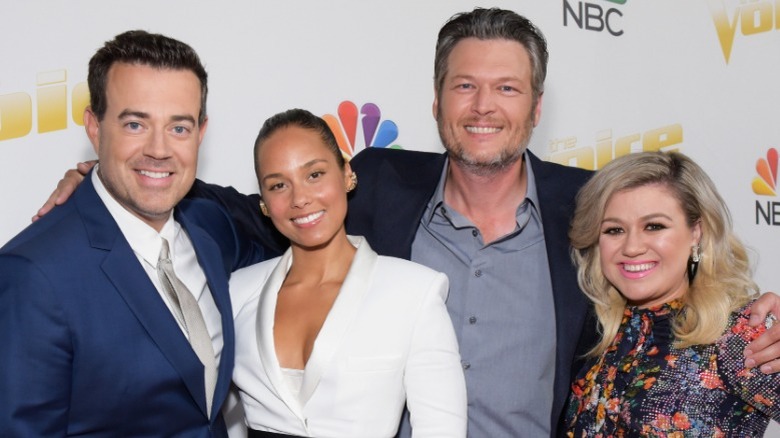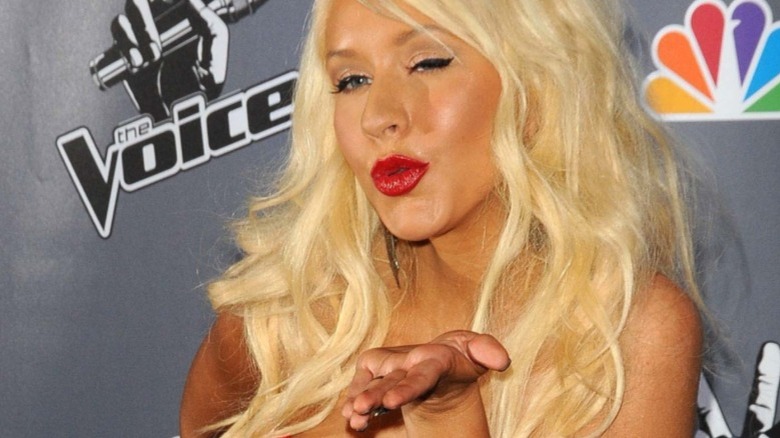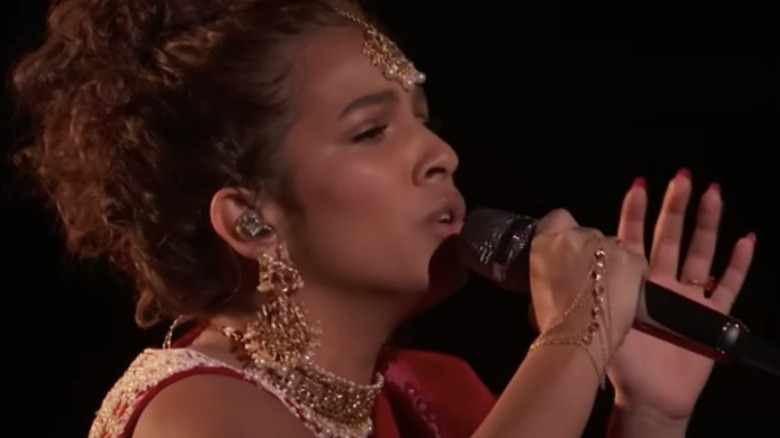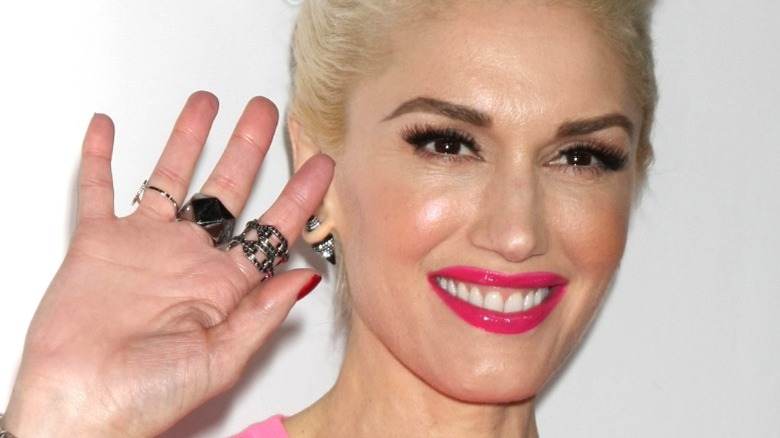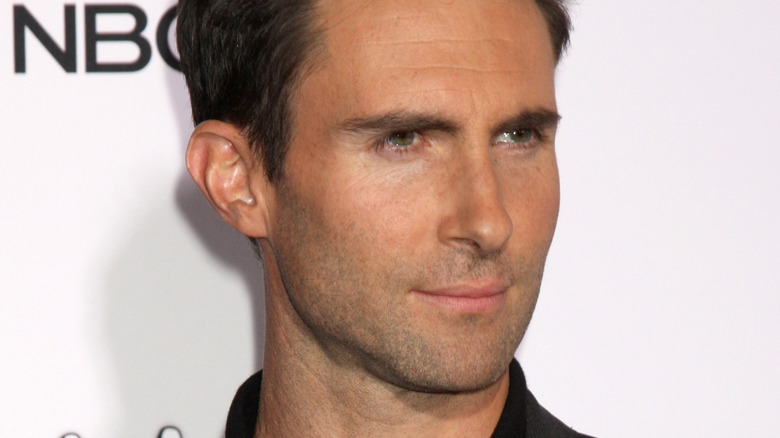The Controversial Side Of The Voice
Television programs that catapult normal everyday Americans to stardom with the help of celebrity judges have become somewhat of the norm in today's culture. Ever since "American Idol" debuted in 2002, the concept of voting on your favorite contestant and following their journey to fame has taken the form of many television programs. While they may not be one and the same, they follow the same objective. Thanks to skillful editing, contestants' stories pull on our heartstrings and we feel compelled to vote for America's next best talent.
But once the stage light dims and filming stops — how likely is it that these winners actually stay relevant? Such is the case for NBC's "The Voice," which debuted in 2011 and has consistently achieved great ratings across its 22 seasons but hardly a memorable winner with a mainstream music career. It could be argued that the show, which has an objective to drive ratings, cares less about launching artists and more about making money. After over a decade on television, the show has only produced five original Top 40 songs and one Grammy nomination. Those stats are starkly different from the many "American Idol" success stories.
Several contestants have come forward to spill on the behind-the-scenes secrets of the show — from insane contracts to contestants being hand-picked by the production team. Not all is fair in the world of talent-competition shows, and we are giving you the inside scoop on the show that turns as many heads as it does chairs. This is the controversial side of "The Voice."
Contestants are subjected to humiliating contracts
Would you sign your life away for the chance to win it all on "The Voice?" Contestants seem to be doing just that according to the show's contract. According to leaked documents obtained by the New York Daily News, participants are subjected to the show changing the rules at any time, including eliminating contestants who are favored by the public. It goes on to detail that the show can ignore votes, and even force contestants to go through psycho-evaluations (even having the power to release the results to the public).
Aspiring "Voice" contestants must prepare for the court of public opinion. A contestant's portrayal "may be disparaging, defamatory, embarrassing (and) may expose me to public ridicule, humiliation or condemnation," according to the 32-page contract. Signers are also subjected to removal from the show at any time based on the production's discretion. That stipulation could be to blame for Judith Hill's shocking upset elimination in Season 4, as viewers have speculated whether her departure was a ploy for dramatic effect. It also could explain away voting discrepancies, which has had the network tossing out "inconsistent" votes more than once. Contestants who divulge any contract details could be liable for up to $1 million, so they have anything but a voice in this case — pun intended.
They were called out for being racist
Tensions flared in the Season 22 semifinals of "The Voice" when the show was accused of being racist after it narrowed it down to its top four contestants. According to USA Today, Judge Blake Shelton had his way — per usual — when his team members Bodie, Brayden Lape and Bryce Leatherwood were advanced to the next round. John Legend's three performers Kim Cruse, Parijita Bastola, and Omar Jose Cardona duked it out in the bottom four against Gwen Stefani's last remaining team member Justin Aaron. Cardona eventually advanced, but not before igniting a firestorm of public opinion.
The top four performers were white, while the bottom four contestants were black — causing many Twitter users to speculate on the show's motives. "The demographic who watches The Voice is definitely racist and favors the young, white, country male singers. They're not even the most talented. Let a POC get the spotlight they deserve. #TheVoice," one user tweeted. "#TheVoice is so f***king white. Four white singer[s], some of [the] questionable singing talent vote[d] through by racist America. The arguably 4 best voices fighting it out for one remaining spot. Have we learned nothing in all these years? #TheVoiceNBC #TheVoice #TheVoicesoWhite," another user wrote. Despite the criticism, some disagree with calling out the network. "Why was this racist? Clearly not everyone enjoys Broadway singers..voice is and always has been diverse despite poc being less than 13% of population..quit with the gaslighting #TheVoice", one viewer tweeted.
Contestants don't choose their own songs
Life for a contestant on "The Voice" is heavily controlled — and that includes the songs they sing. Former Season 1 contestant Frenchie Davis went on to win her battle round with Beyonce's famous track "Single Ladies", but she never understood why the song was handpicked for her to duke it out against Tarralyn Ramsey. "It's always hysterical when the judges say, 'I don't think that was a good song choice for you,' and I'm thinking, You picked that song,'" Davis told Cosmopolitan.
Despite it being the norm for battle round songs to be out of the contestant's hands — it's not always the case on the show. Season 16 winner Maelyn Jarmon told Country Living that collaborating with her coach John Legend made all the difference. "Those song choices are everything. I think the advantages [of working with John] were that he knew how to pick songs for me and he knew once he heard my voice what would work," Jarmon revealed. The winner told the magazine that once a mutually agreed upon song was reached with her coach, legal steps followed. "Every time after the last few rounds when I knew she had advanced, I'd do calls with her just to go over song ideas and we would have the person in charge of going out and getting licenses on the phone to make sure we could actually pull off the requests we had," Legend said.
Adam Levine's controversial comment
When Judith Hill was shockingly eliminated from Season 4 of "The Voice," nobody was more surprised than her coach Adam Levine. So much so, that the Maroon 5 singer was caught saying "I hate this country," thanks to his hot mic. Hill quickly garnered love from fans as a former backup singer for Michael Jackson, and the contestant was set to duet with the star on his "This Is It" tour before he passed away unexpectedly.
Levine first addressed his comment by tweeting the definition of "humorless," seemingly taking a stab at his critics. He went on to make an official apology statement (via The Hollywood Reporter) saying "I obviously love my country very much and my comments last night were made purely out of frustration. Being a part of 'The Voice', I am passionately invested in my team and want to see my artists succeed. Last night's elimination of Judith and Sarah was confusing and downright emotional for me and my comments were made based on my personal dissatisfaction with the results." Despite his apology, the "Moves Like Jagger" singer received mixed reactions from Twitter users. "@adamlevine OWN your s***! We all have disappointments but u don't blame your country! #disgraceadamlevine you basically said voters suck!??" one user tweeted. Others, however, seemed just as upset at the unforeseen upset elimination. "@adamlevine you are not alone brother. so unbelievably shocked and saddened and MADDENED at what happened last night too," another user wrote.
Glitches in voting
It may be "The Voice," but that doesn't mean that every voter has one. The show has run into its fair share of voting glitches over the 22 seasons it has been on the air. As per Billboard, the first controversy occurred on Season 4 when Host Carson Daly admitted to the audience that inconsistencies in that week's online and text votes had led to the network tossing out all votes cast online or via text. "Telescope certifies that removing those votes did not affect the outcome for any team. Is that correct?" Daly asked onstage, to which the Telescope representative replied "That's 100 percent correct." It didn't help to ease the wavering confidence in viewers, however.
The show found itself in the middle of another voting controversy in Season 6, involving that season's winner, Josh Kaufman. Viewers were able to cast votes by downloading a contestant's song on iTunes, but Kaufman's was difficult for voters to find during the broadcast. His song had been located under the albums section and not the song section, making it difficult for fans to track it down, ultimately affecting his number of downloads. The network decided to resolve the controversy by not counting any votes cast by iTunes, and Daly once again tried to resolve viewers' skepticism by promising them the outcome wasn't changed by the tossed-out votes. As previously discussed, the network can do whatever they wish with votes according to their controversial contract, so who's really counting anyways?
Coaches are not as present as they seem
Despite what viewers see on television, the beloved celebrity coaches on "The Voice" may not be as hands-on as they seem. Though the production team wants you to believe these big stars take time out of their jam-packed schedule to hand down tokens of hard-earned wisdom to their team members — it's just not the case. Former contestant Ddendyl Hoyt told the Washington Post that his coach Shakira wasn't as present as skillful editing led viewers to believe. "The majority of our growth was left to us on our own," Hoyt revealed, adding that she only met the "Hips Don't Lie" singer for taped coaching sessions. The Season 6 contestant went on to reveal that much of the constructive criticism comes from team members that never appear on-air. "The vocal coaches, the band director, the producers — everyone has notes for you," Hoyt confessed.
Not every former contestant had the same coaching experience, however. Season 1 contestant Dia Frampton told Cosmopolitan that her former coach Blake Shelton always texted back "whenever I was worried or uneasy about something." Kat Perkins had a similar experience on Season 6, recalling that her coach Adam Levine was available by a "Voice" specific email and phone number that was managed by his assistant. "I could email Adam literally 24/7 and he was really great about responding and making sure I felt comfortable, even during the night before." Former Season 1 and 2 contestants also revealed Shelton opened his house for parties and barbecues.
Contestants are hand-picked by production
As much as "The Voice" wants you to believe that contestants are all given a fair shot, think again — this is an edited television program after all. Singer Adam Weiner said as much to Digital Music News when he revealed that one of the casting agents for the show contacted his agent Stu Walker. Weiner is the frontman for Low Cut Connie, an American rock and roll band based out of Philadelphia. "After some emails back and forth between them, with Stu not showing a huge amount of haste or passion for the idea, she let him know that someone had dropped out of season 9 and that they wanted to fast-track me onto the current season that they were about to start shooting," Weiner said. Ultimately the musician declined the offer, not wanting to drop tour dates and get wrapped into a binding contract with the network.
Chloe Kohanski had a similar experience on Season 13 of the show. The former contestant went on to win the competition and later revealed that she didn't even have to audition. The singer told Parade magazine that she was handpicked to be a contestant. "Weirdly enough, I received a phone call. I have been playing in Nashville for, like, four years and someone saw me at a show and they got my contact info and called and they were like, "Do you want to audition for 'The Voice'? We will fly you out," so that is what I did," Kohanski admitted.
Very few winners have achieved mainstream success
The idea of an everyday average Joe turning into a superstar overnight is something that drives American pop culture — and television ratings. Given mediums like Instagram and TikTok, it seems like everybody has a fair shot. On shows like "The Voice," however, the network capitalizes on the fame of its celebrity judges more than the amateur singers that it seemingly promotes. Judge Adam Levine has the show to thank for his career uptick, launching a Kmart deal and two fragrances after he initially signed on for a three-year contract with "The Voice." His album "Overexposed" which was his first release post "Voice" debuted at number two in the United States and number one in the United Kingdom. It's no secret that the super-star judges use the platform to gain even more notoriety — take any number of their live performances for example.
With the great ratings and big-name judges, why is it that so few artists have achieved mainstream success after winning the show? In over a decade of "The Voice" being on-air, it has yet to produce a star similar to "American Idol" winners Kelly Clarkson or Carrie Underwood. The problem, according to Levine, stems from mismanagement with Republic Records, the company that signs the winning "Voice" contestant. "No one knows what they're doing," he told the Howard Stern Show (via the Washington Post). Just ask Alisan Porter, who won Season 10. "Not everything worked out perfectly with my 'record deal' so I went back to the drawing board," she tweeted in 2017.
It's just good TV
"The Voice" hardly ever props up artists with the best talent. Will.i.am, who has been a judge on the show's UK program, revealed that the network seeks to produce good television — not fulfill an artist's expectations. "It's typical TV. They rarely vote for the person with the best voice. It isn't really the best voice that wins, even though the show is called 'The Voice,'" he revealed to Switched On (via News Corp Australia), "There is something sentimental, tugging on emotion, or people gravitate to that [artist's] personality that factors in on why someone wins. Although the beginning of the show is about the voice, the end of the show is always up for the people's vote and the people always vote via emotions.”
Season One's runner-up Dia Frampton would agree after she revealed to HuffPost that her backstory was taken out of context by the production team. "I was introduced as the children's book author, which was something I very lightly touched upon when we were doing interviews," she confessed. Frampton went on the show to promote her and her sister's indie-rock band "Meg & Dia," which was never mentioned on the show. What was mentioned, however, was her love of yoga, which she felt she only lightly touched on. Though she signed with Universal Records as a solo artist, her fame fizzled out shortly after it began. Post "Voice" Frampton found herself back to square one, working minimum wage and helping write songs for other artists.
Adam Levine sells out his own team member
Adam Levine has had his fair share of hiccups on "The Voice." The "Animals" singer came under fire yet again in Season 15 when he favored one of his team members over the other. The issue arose when Levine's team members DeAndre Nico and fan-favorite Reagan Strange were both in the bottom three, but Strange was sick and unable to perform. As per USA Today, the "Sugar" singer encouraged viewers to vote for Strange over Nico, even though Nico had sung and she had not. "I have a very special relationship with Reagan ... I've got to fight for my girl," he told audience members, who ultimately opted to save Strange.
Nico spoke to 12 News Now about the elimination saying, "I just felt like he sold me out and I just don't respect it," adding, "we did our job, sick or not... I just got over laryngitis, and still, when I came back I still sang." Nico went on to say he felt cast aside by his own coach, who in his words, "could have put in some words for me." Levine addressed the controversy on a later episode saying "It was a strange week, but it's over now, DeAndre's my boy. I love him. We talked." Not all viewers were convinced, however, with one tweeting, "Lost all respect for Adam Levine in this moment. His lack of respect for his other contestant was despicable! He could have shown grace, respect and courtesy to DeAndre then put in a plug for Reagan."

